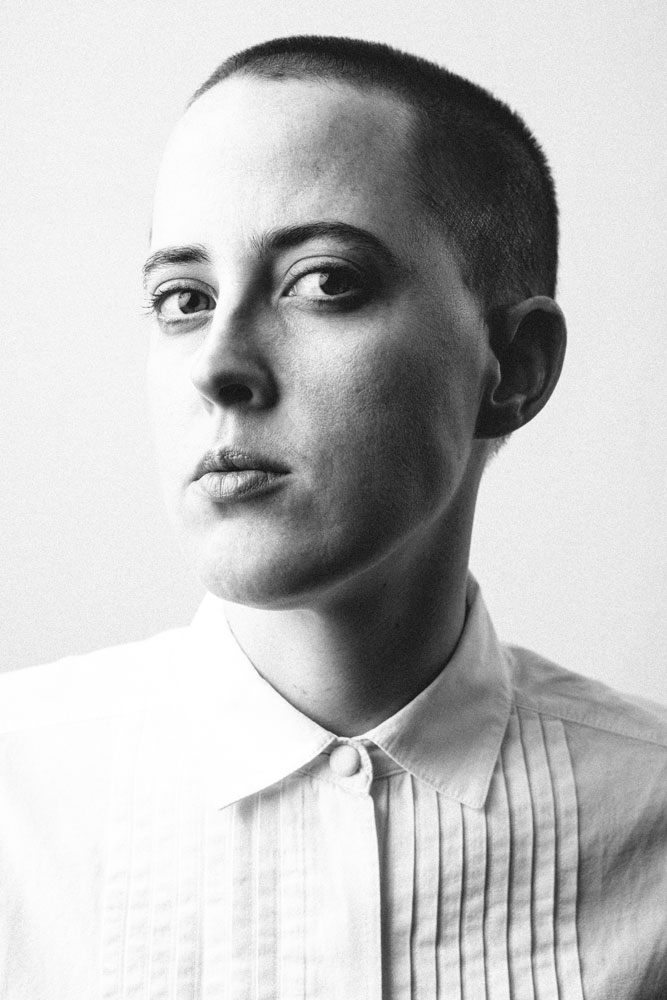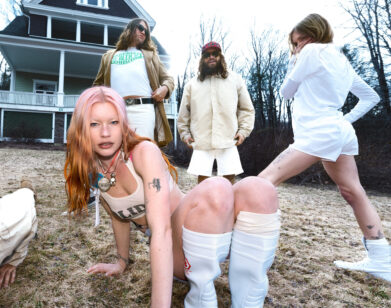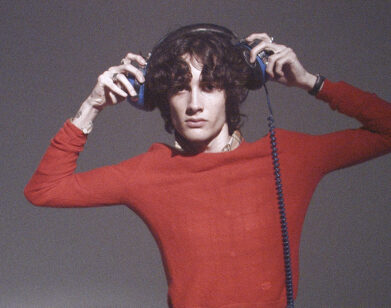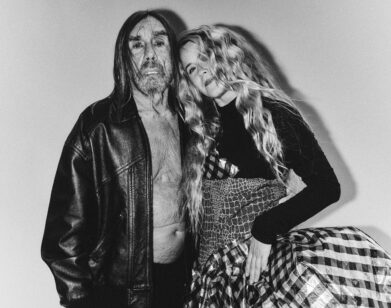Lower Dens Looks Inward

JANA HUNTER OF LOWER DENS IN BALTIMORE, JANUARY 2015. PHOTO BY FRANK HAMILTON.
On the 2012 album Nootropics, Lower Dens built its sound around the robotic touchstones of artists like Kraftwerk and Brian Eno, while lyrically, frontwoman Jana Hunter attempted to unpack the implications of trans-humanism. On a conceptual level, Nootropics was a heady beast, anchored by the band’s strong, dark, and tension-filled songwriting.
On the Baltimore-based band’s latest album, Escape from Evil (out tomorrow, March 31), that beguiling sense of menace is still very present, aided and abetted by Hunter’s minimal guitar work and deep, slick vocals. This time around, however, the subject matter is less esoteric, hitting closer to home. According to Hunter, Escape from Evil‘s lyrical content is more spontaneous, making for words that stick with listeners long after the songs’ endings. When Hunter croons—and later bellows—the line “I will treat you better” on the single “Ondine,” her story feels both deeply personal and also immediately relatable.
Earlier this month, we phoned Hunter to talk lyrics, intentions, and the many hurdles it took to complete the album.
ALY COMINGORE: I noticed that you’ve been volunteering at a Girls Rock camp.
JANA HUNTER: Yeah. I taught some guitar classes, but I was mostly mentoring these two bands—a band of younger girls and a band of teenagers.
COMINGORE: Growing up, did you have someone acting as a musical mentor for you?
HUNTER: I had nothing like that—nothing as liberating as Girls Rock seems to be for those kids. I played in orchestras starting when I was about 9 years old until I was about 18, and those were really important to me, but it was much more of a self-driven enterprise. My parents weren’t invested in it. We had teachers, but they weren’t coaches by any means. I had older siblings that I looked up to, and my mom and my dad, but I never really had anything in the way of a mentor.
COMINGORE: When did you start writing songs?
HUNTER: In orchestras I composed stuff, but I don’t even know what it was like. The first song I really remember writing, I was 14 and it was a very simple rhyming and melodies ditty. I don’t even want to recite the bit of it that I do remember. [laughs] I think I started to try to write songs in earnest when I was about 16. I played in a band with other kids from orchestra. It was a very dorky band with conga drums and a cello and a violin and an acoustic guitar. It was awful.
COMINGORE: But you were all probably pretty technically proficient.
HUNTER: Yeah, and we were excited about it and we were proud of it, but looking back it was really bad. [laughs] But in the context of that band I started to write my own material, and then it was a couple of years before I was writing things that would end up on my first release.
COMINGORE: Where was the collective headspace of the band coming off the last tour for Nootropics?
HUNTER: We all wanted to write, me included. We had been playing with the same group of people consistently for a long time and it had become less like a band of people and more like an ensemble. Soundchecks would be these improv sessions where we actually managed to write things that were fairly compelling. It was the first time I’d ever been in a group like that. I think we finished touring in December of 2012 and we scheduled our first writing session for this record for February of 2013. We were ready to dive right into it. Looking back on it, we probably should have taken more time, but I think we wanted to capitalize on the fluency that we had with each other, which can dissipate really quickly outside of tour.
COMINGORE: You moved around a lot in the process of making this album. Was the initial plan to have multiple producers and be in multiple studios?
HUNTER: No. That just came out of this record being a bitch to make.
COMINGORE: How so?
HUNTER: We didn’t have as much money as we did to work on our last record. We had a band that was less of a defined unit for a time. We went through many phases of what the record might have been—that the band wasn’t going to play on it, that we were going to work with different producers for every song. These were all bad ideas, but they were ideas that I entertained from other people. Eventually I went with our drummer Nate [Nelson] to Dallas to work with John Congelton—and we were excited to work with him—but when we got the rough mixes I just wasn’t excited about the direction. After that I convinced the label to let me self-produce. I went and bought a mic preamp from Guitar Center and recorded a lot of stuff with it at home and then returned it within the 30-day refund period. [laughs] And we went into the studio with Chris Coady, who I knew I could work with and who would help me tie this very loose beast up into something cohesive. Or something that at least made sense.
COMINGORE: I was surprised to see how many people had their hand in it. It plays through seamlessly.
HUNTER: Good! I truly don’t know how that happened. I felt like I was holding onto a rope that was attached to something going much faster than I was. I think we just knew from early on that it was worth doing whatever it took to get it finished.
COMINGORE: What was the first song to come together?
HUNTER: It was “Ondine.” It’s a little bit different [now]. The demo of that song is special; it’s a little bit more conventional of an arrangement than what we ended up with—which is to say that it was just guitar and bass and drums—but it came together very quickly. Before we were even done with our initial writing sessions I already had the vocals recorded. Of all of the songs on the record, that one has the least conscious personal attachment to something in my life, or something that was going on in the band. What I’m trying to say is that I don’t know what that song is about. It came out of a subconscious place. Having said that, it’s very emotional and I feel really strongly about it and I feel like I’m full of emotion when I’m singing it, but I don’t know why, and I don’t really want to. There’s something to be said for letting some things remain mysterious.
COMINGORE: Do you feel like you tend to write with more intention than that?
HUNTER: It changes. With Nootropics, I made a list on a piece of notebook paper of all the things that I was going to write about, and I did—I wrote about all of them. But I wanted this record to be a little bit more spontaneous. When I was a kid, songs allowed me to simultaneously process something that was going on in my life and lift myself out of that thing. I really wanted to be able to do that with my writing. I also wanted these songs to be able to function like that for other people. As proud as I am of Nootropics, I don’t think it functions that way, and I wanted to write songs that could.
COMINGORE: Looking back, what do you think was the guiding force for you lyrically?
HUNTER: The title comes from a book about human motivation. It’s the idea that we, as creatures that have to survive, do things to protect ourselves that, when put together with everyone else doing the same thing, maybe do more harm than good for our species. I think this record is about that on an individual scale. It’s me confronting some things in myself and trying to find a way to be a better person, trying to find a way to not hurt people, trying to know when it is okay to cut yourself off from somebody. Ultimately, the very first thing that I was thinking about when we started writing this record was letting things be simple, despite the fact that they feel complex, and remembering that there are only a couple of things in life that are really important. One of them is being good to yourself and the people that you love.
ESCAPE FROM EVIL IS OUT TOMORROW, MARCH 31, VIA RIBBON MUSIC. FOR MORE ON LOWER DENS, VISIT THE BAND’S WEBSITE.






